#locational privacy
Explore tagged Tumblr posts
Text
Google’s new phones can’t stop phoning home

On OCTOBER 23 at 7PM, I'll be in DECATUR, presenting my novel THE BEZZLE at EAGLE EYE BOOKS.

One of the most brazen lies of Big Tech is that people like commercial surveillance, a fact you can verify for yourself by simply observing how many people end up using products that spy on them. If they didn't like spying, they wouldn't opt into being spied on.
This lie has spread to the law enforcement and national security agencies, who treasure Big Tech's surveillance as an off-the-books trove of warrantless data that no court would ever permit them to gather on their own. Back in 2017, I found myself at SXSW, debating an FBI agent who was defending the Bureau's gigantic facial recognition database, which, he claimed, contained the faces of virtually every American:
https://www.theguardian.com/culture/2017/mar/11/sxsw-facial-recognition-biometrics-surveillance-panel
The agent insisted that the FBI had acquired all those faces through legitimate means, by accessing public sources of people's faces. In other words, we'd all opted in to FBI facial recognition surveillance. "Sure," I said, "to opt out, just don't have a face."
This pathology is endemic to neoliberal thinking, which insists that all our political matters can be reduced to economic ones, specifically, the kind of economic questions that can be mathematically modeled and empirically tested. It would be great if all our thorniest problems could be solved like mathematical equations.
Unfortunately, there are key elements of these systems that can't be reliably quantified and turned into mathematical operators, especially power. The fact that someone did something tells you nothing about whether they chose to do so – to understand whether someone was coerced or made a free choice, you have to consider the power relationships involved.
Conservatives hate this idea. They want to live in a neat world of "revealed preferences," where the fact that you're working in a job where you're regularly exposed to carcinogens, or that you've stayed with a spouse who beats the shit out of you, or that you're homeless, or that you're addicted to Oxy, is a matter of choice. Monopolies exist because we all love the monopolist's product best, not because they've got monopoly power. Jobs that pay starvation wages exist because people want to work full time for so little money that they need food-stamps just to survive. Intervening in any of these situations is "woke paternalism," where the government thinks it knows better than you and intervenes to take away your right to consume unsafe products, get maimed at work, or have your jaw broken by your husband.
Which is why neoliberals insist that politics should be reduced to economics, and that economics should be carried out as if power didn't exist:
https://pluralistic.net/2024/10/05/farrago/#jeffty-is-five
Nowhere is this stupid trick more visible than in the surveillance fight. For example, Google claims that it tracks your location because you asked it to, by using Google products that make use of your location without clicking an opt out button.
In reality, Google has the power to simply ignore your preferences about location tracking. In 2021, the Arizona Attorney General's privacy case against Google yielded a bunch of internal memos, including memos from Google's senior product manager for location services Jen Chai complaining that she had turned off location tracking in three places and was still being tracked:
https://pluralistic.net/2021/06/01/you-are-here/#goog
Multiple googlers complained about this: they'd gone through dozens of preference screens, hunting for "don't track my location" checkboxes, and still they found that they were being tracked. These were people who worked under Chai on the location services team. If the head of that team, and her subordinates, couldn't figure out how to opt out of location tracking, what chance did you have?
Despite all this, I've found myself continuing to use stock Google Pixel phones running stock Google Android. There were three reasons for this:
First and most importantly: security. While I worry about Google tracking me, I am as worried (or more) about foreign governments, random hackers, and dedicated attackers gaining access to my phone. Google's appetite for my personal data knows no bounds, but at least the company is serious about patching defects in the Pixel line.
Second: coercion. There are a lot of apps that I need to run – to pay for parking, say, or to access my credit union or control my rooftop solar – that either won't run on jailbroken Android phones or require constant tweaking to keep running.
Finally: time. I already have the equivalent of three full time jobs and struggle every day to complete my essential tasks, including managing complex health issues and being there for my family. The time I take out of my schedule to actively manage a de-Googled Android would come at the expense of either my professional or personal life.
And despite Google's enshittificatory impulses, the Pixels are reliably high-quality, robust phones that get the hell out of the way and let me do my job. The Pixels are Google's flagship electronic products, and the company acts like it.
Until now.
A new report from Cybernews reveals just how much data the next generation Pixel 9 phones collect and transmit to Google, without any user intervention, and in defiance of the owner's express preferences to the contrary:
https://cybernews.com/security/google-pixel-9-phone-beams-data-and-awaits-commands/
The Pixel 9 phones home every 15 minutes, even when it's not in use, sharing "location, email address, phone number, network status, and other telemetry." Additionally, every 40 minutes, the new Pixels transmit "firmware version, whether connected to WiFi or using mobile data, the SIM card Carrier, and the user’s email address." Even further, even if you've never opened Google Photos, the phone contacts Google Photos’ Face Grouping API at regular intervals. Another process periodically contacts Google's Voice Search servers, even if you never use Voice Search, transmitting "the number of times the device was restarted, the time elapsed since powering on, and a list of apps installed on the device, including the sideloaded ones."
All of this is without any consent. Or rather, without any consent beyond the "revealed preference" of just buying a phone from Google ("to opt out, don't have a face").
What's more, the Cybernews report probably undercounts the amount of passive surveillance the Pixel 9 undertakes. To monitor their testbench phone, Cybernews had to root it and install Magisk, a monitoring tool. In order to do that, they had to disable the AI features that Google touts as the centerpiece of Pixel 9. AI is, of course, notoriously data-hungry and privacy invasive, and all the above represents the data collection the Pixel 9 undertakes without any of its AI nonsense.
It just gets worse. The Pixel 9 also routinely connects to a "CloudDPC" server run by Google. Normally, this is a server that an enterprise customer would connect its employees' devices to, allowing the company to push updates to employees' phones without any action on their part. But Google has designed the Pixel 9 so that privately owned phones do the same thing with Google, allowing for zero-click, no-notification software changes on devices that you own.
This is the kind of measure that works well, but fails badly. It assumes that the risk of Pixel owners failing to download a patch outweighs the risk of a Google insider pushing out a malicious update. Why would Google do that? Well, perhaps a rogue employee wants to spy on his ex-girlfriend:
https://www.wired.com/2010/09/google-spy/
Or maybe a Google executive wins an internal power struggle and decrees that Google's products should be made shittier so you need to take more steps to solve your problems, which generates more chances to serve ads:
https://pluralistic.net/2024/04/24/naming-names/#prabhakar-raghavan
Or maybe Google capitulates to an authoritarian government who orders them to install a malicious update to facilitate a campaign of oppressive spying and control:
https://en.wikipedia.org/wiki/Dragonfly_(search_engine)
Indeed, merely by installing a feature that can be abused this way, Google encourages bad actors to abuse it. It's a lot harder for a government or an asshole executive to demand a malicious downgrade of a Google product if users have to accept that downgrade before it takes effect. By removing that choice, Google has greased the skids for malicious downgrades, from both internal and external sources.
Google will insist that these anti-features – both the spying and the permissionless updating – are essential, that it's literally impossible to imagine building a phone that doesn't do these things. This is one of Big Tech's stupidest gambits. It's the same ruse that Zuck deploys when he says that it's impossible to chat with a friend or plan a potluck dinner without letting Facebook spy on you. It's Tim Cook's insistence that there's no way to have a safe, easy to use, secure computing environment without giving Apple a veto over what software you can run and who can fix your device – and that this veto must come with a 30% rake from every dollar you spend on your phone.
The thing is, we know it's possible to separate these things, because they used to be separate. Facebook used to sell itself as the privacy-forward alternative to Myspace, where they would never spy on you (not coincidentally, this is also the best period in Facebook's history, from a user perspective):
https://papers.ssrn.com/sol3/papers.cfm?abstract_id=3247362
And we know it's possible to make a Pixel that doesn't do all this nonsense because Google makes other Pixel phones that don't do all this nonsense, like the Pixel 8 that's in my pocket as I type these words.
This doesn't stop Big Tech from gaslighting* us and insisting that demanding a Pixel that doesn't phone home four times an hour is like demanding water that isn't wet.
*pronounced "jass-lighting"
Even before I read this report, I was thinking about what I would do when I broke my current phone (I'm a klutz and I travel a lot, so my gadgets break pretty frequently). Google's latest OS updates have already crammed a bunch of AI bullshit into my Pixel 8 (and Google puts the "invoke AI bullshit" button in the spot where the "do something useful" button used to be, meaning I accidentally pull up the AI bullshit screen several times/day).
Assuming no catastrophic phone disasters, I've got a little while before my next phone, but I reckon when it's time to upgrade, I'll be switching to a phone from the @[email protected]. Calyx is an incredible, privacy-focused nonprofit whose founder, Nicholas Merrill, was the first person to successfully resist one of the Patriot Act's "sneek-and-peek" warrants, spending 11 years defending his users' privacy from secret – and, ultimately, unconstitutional – surveillance:
https://www.eff.org/deeplinks/2013/03/depth-judge-illstons-remarkable-order-striking-down-nsl-statute
Merrill and Calyx have tapped into various obscure corners of US wireless spectrum licenses that require major carriers to give ultra-cheap access to nonprofits, allowing them to offer unlimited, surveillance-free, Net Neutrality respecting wireless data packages:
https://memex.craphound.com/2016/09/22/i-have-found-a-secret-tunnel-that-runs-underneath-the-phone-companies-and-emerges-in-paradise/
I've been a very happy Calyx user in years gone by, but ultimately, I slipped into the default of using stock Pixel handsets with Google's Fi service.
But even as I've grown increasingly uncomfortable with the direction of Google's Android and Pixel programs, I've grown increasingly impressed with Calyx's offerings. The company has graduated from selling mobile hotspots with unlimited data SIMs to selling jailbroken, de-Googled Pixel phones that have all the hardware reliability of a Pixel, coupled with an alternative app suite and your choice of a Calyx SIM and/or a Calyx hotspot:
https://calyxinstitute.org/
Every time I see what Calyx is up to, I think, dammit, it's really time to de-Google my phone. With the Pixel 9 descending to new depths of enshittification, that decision just got a lot easier. When my current phone croaks, I'll be talking to Calyx.

Tor Books as just published two new, free LITTLE BROTHER stories: VIGILANT, about creepy surveillance in distance education; and SPILL, about oil pipelines and indigenous landback.


If you'd like an essay-formatted version of this post to read or share, here's a link to it on pluralistic.net, my surveillance-free, ad-free, tracker-free blog:
https://pluralistic.net/2024/10/08/water-thats-not-wet/#pixelated

Image: Cryteria (modified) https://commons.wikimedia.org/wiki/File:HAL9000.svg
CC BY 3.0 https://creativecommons.org/licenses/by/3.0/deed.en
#pluralistic#google#android#pixel#privacy#pixel 9#locational privacy#back doors#checkhov's gun#cybernews#gaslighting
537 notes
·
View notes
Text
Critical PSA for anyone with Android devices!
I got the following email this morning:


Basically Google is rolling out the ability to track you via your android devices even when you're offline and you have to manually opt out of it. Many android devices no longer come with a wired headphone jack, so if you have Bluetooth headphones or a keyboard or anything, your location will be tracked and stored by your device unless you opt out of this.
I tried using the link they gave me in the email to opt out of it, but it didn't really seem to do anything. So I looked up how to opt out and found the following steps, which worked for my phone:
Opting out from the Find My Device network is as simple as tapping a toggle in your phone's settings. 1. On your Android device, go to Settings. 2. Tap the Google setting. 3. Tap the Find My Device setting. 4. Tap the toggle to off next to "Use Find My Device." 5. Confirm with pin, pattern, or biometrics. That's it. Your device is no longer participating in the Find My Device network. To rejoin, just flip the toggle back on.
Please reblog to spread awareness. My husband has the same phone as me and he didn't get any emails about this.
22K notes
·
View notes
Photo

FBI admits to circumventing warrant laws by using capitalism instead Surprise! The FBI has been involved in warrantless surveillance! But that's not particularly surprising; we've known that for a while now (even in some pundits like to pretend as if it's absolutely unprecedented when the FBI occasionally stops monitoring Muslims, Black rights, and environmental activists and turns their attention to money laundering networks surrounding right-wing politicians). — Read the rest https://boingboing.net/2023/03/10/fbi-admits-to-circumventing-warrant-laws-by-using-capitalism-instead.html
#defund the fbi#Post#data privacy#fbi#Federal Bureau of Corrupt Officials#location data#location privacy#locational privacy#the fbi#warrantless surveillance#warrantless wiretapping#Thom Dunn#Boing Boing
0 notes
Text


I'm pretty sure drive to survive were there filming their padel game today!
92 notes
·
View notes
Text
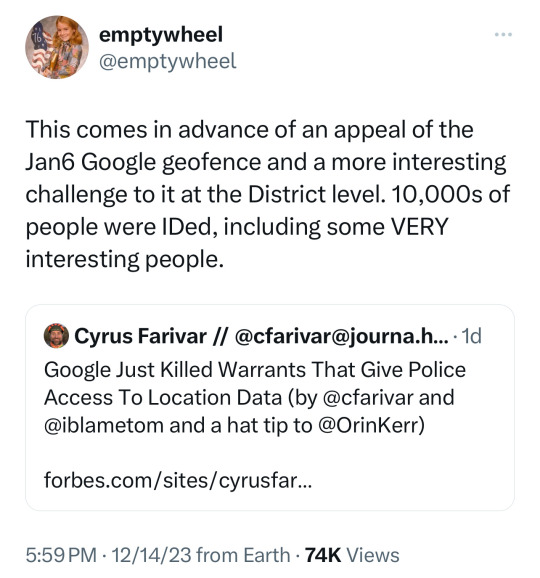
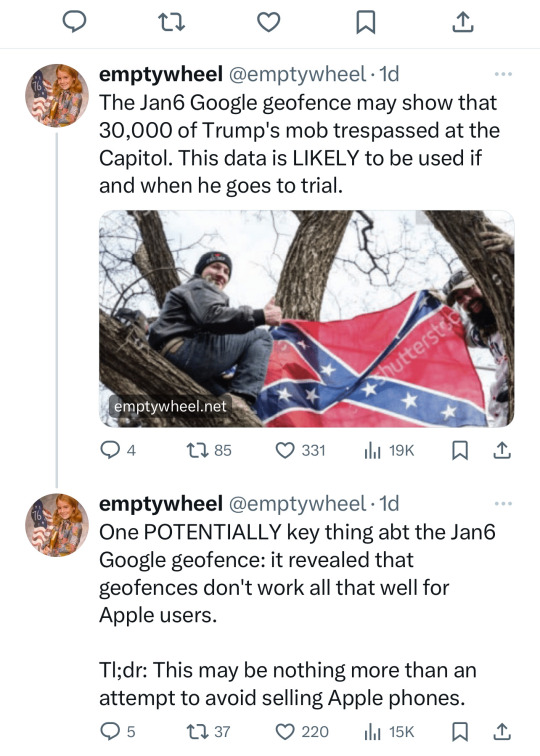
So here is the long and short of it:
Google used (uses) geofencing data, location data that undeniably shows where you and your phone have been.
Google sells this data to data brokers and advertisers, whether you like it or not. And yeah, it wouldn’t surprise me if Apple also did/does this, but if they do, Tim Cook has done a yeoman’s job of keeping it secret.
Google also hands out your location data to police departments (and governmental agencies led by conservative, anti-abortion Republicans, but I’m sure that’s unimportant, right?).
Now—and here’s the crux of the matter—just as the government was using Google’s location data to prosecute January 6th rioters, Google has had a sudden change of heart and will effectively limit their ability to remotely store your GPS information on their servers (which means it will mostly only be available locally on your Android phone’s hard drive, thus making it significantly harder - not completely impossible - for Google to give the police access to bulk location data, even if presented with a search warrant).
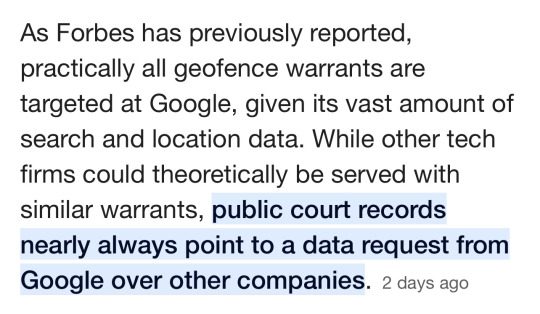
The bottom line is, it was always wrong for Google to collect and then sell their “reverse location search data” to advertisers, data miners, the police and the government. The germane question is, why now? Why has Google suddenly found Jesus, so to speak, and decided that customers privacy rights are sacrosanct, just as the U.S. government is using that data to prosecute Trump sycophants who wanted to overthrow the election?
SN: I think the whole green bubble vs. blue bubble argument is a stupid made up problem by whiny people who don’t have enough real problems in life (if you disagree then please go make your own post), and Idgaf if you’re an Android or an iPhone user. If you’re happy with your phone, that’s all that matters — but our privacy rights constantly being violated isn’t trivial, that’s actually very important. And Google suddenly deciding that now is the best time for them to end their practice of ratting people out seems highly sus.
👉🏿 https://www.emptywheel.net/2023/11/25/the-maga-tourist-geofence-and-the-violent-confederate-flag-toting-geofence/
👉🏿 https://www.forbes.com/sites/cyrusfarivar/2023/12/14/google-just-killed-geofence-warrants-police-location-data/
#politics#google#location data#privacy rights#surveillance state#geofencing#reverse location searches#andriod#android phones#j6#j6 insurrection
129 notes
·
View notes
Text
Very short Enver Gortash x GN! Reader

You: ENVER!!!
Gortash going pale: Daaarling... There you are! *he smiles pleasantly, while internally his mind races desperately trying to find which specific evil plot you are mad about and how to explain himself *
#gn!reader#baldur's gate 3 x reader#enver gortash#enver gortash x reader#don't mind me but this would very likely be a common thing to happen#The man can almost detect which plot you found out depending on the way you yell his name#It's so common that he develops a sixth sense as you approach his location#You're turning for the main Hall to his office and he's already dismissing his guards for privacy#Cause he is going to have to answer for a lot#Also throws at himself some shields depending on which evil deed you found out#gortash x tav
240 notes
·
View notes
Text




Special Ops: Lioness - 1x07
#specialopslionessedit#special ops lioness#special ops: lioness#cruz manuelos#sol joe#laysla de oliveira#zoe saldana#nicole kidman#special ops lioness 1x07#special ops lioness spoilers#aaliyah x cruz#femslash related stuff#so the car ride happens first and after that must be the talk?#when they say transmitter do they mean a location beacon or a full mic#the first would be kinda major but the second implies Privacy#but her phrasing here means she thought about leaving it off?#clearly it was off long enough for these two to get worried#I guess we'll seeee#less than 10 hours left
187 notes
·
View notes
Note
Ok so the ability to process lactose is a genetic mutation that is/was mostly found in (and in those descended from) ancient societies that reared cattle or goats n shit.
My theory is most or all or most of the alien characters would likely be lactose intolerant which makes the scene where Teal’c and Jonas ate ice cream a lot funnier. They fighting for their lives twice that day.
LMAO CANON also I made the perfect meme for this like four years ago and it’s FINALLY relevant so thank you for this unique opportunity that 21 year old me was looking for
I present to you now: Jonas and Teal’c in the Cheyenne Mountain washroom after the Ice Cream Scene

#bad stargate asks#stargate#stargate sg1#sg1#teal’c#Jonas Quinn#this was made bc the bathrooms at my old house were located very close to heavily populated areas#bc it was an old RCMP shack#2 of them were off the living room (ye olde bullpen)#and the other one was just off our (carpeted) kitchen (ye olde break room)#and my ex was lactose intolerant so it was always so anxiety inducing#we had like 6 roommates and constantly had a party going so it was hard to get any privacy for more painful washroom experiences
83 notes
·
View notes
Text
ya know… I may be delusional, but I feel like I actually have a decent shot at my dream internship this summer… Come the new year, I am going to reach out to my contacts in the organization and see if they can put me in touch with the hiring manager so I can introduce myself… And, since they are not a well-known location, I doubt that they have many applicants, which also gives me a better shot… AND I have a few tricks up my sleeve for #ShowingNotTelling how committed I am to working with them specifically… JUST perhaps it could all work out…
#calling it ‘the organization’ makes it sound so sketchy lmaooooo - it’s just a nature-related org that i’m not naming for privacy#but YEAH.#planning to consume every piece of information on this place that i can#AND write a research paper about some of the focus species of the internship for class#bc i just HAPPEN to be taking conservation biology next semester so it’s literally perfect#i want to be their most informed applicant by a LONGSHOT#which - let me tell you - that makes a BIG difference#as someone who has interviewed a decent amount of interns… most of them don’t know jack shit about the location of the internship#which is like. SORT OF IMPORTANT TO KNOW when it comes to nature and/or history#so to be able to actually intelligently express how excited i am to work at THEIR LOCATION SPECIFICALLY#and WITH THEIR FOCUS SPECIES#that should give me a BIG boost#and like. istg i’m gonna apply to other positions as well…#i’m not MARRIED to this one#but something about it… idk…#i’m willing to fight for it#and i WILL
8 notes
·
View notes
Text
Targeted ads, contact syncing, etc are the worst as a schizospec
#seriously how do we stop it from serving us ads for things people around us have searched for and vice versa???#and often i need location services on so google maps can tell me how late or on time i am#I'm sick of all this spying bullshit#I'm not just being paranoid either#also ummm contact syncing is driving me up the wall!!!#srsly considering deleting Snapchat for that and other reasons#it turned contact syncing back on and now colleagues at new job are in quick add 🤬#I'm fuggin FUMING#at least Instagram and Fb contact syncing seems to be off still?#eff these anti-privacy companies#schizospec#schizospec things#schizospec problems#privacy#privacy rights#and no don't ask me for my snap pls n thanks#actually schizospec#schizoaffective#schizophrenia#actually schizophrenic#actually schizoaffective#mental illness#mental health awareness#mental health#chronic illness#invisible disability#hidden disability#and my search history is pretty darn CHAOTIC#but yeah i just realized that the article that a woman at my group mentioned seeing the headline for#was one i had open in a Chrome tab
9 notes
·
View notes
Text
Async mugwump linkdump

I'm on tour with my new, nationally bestselling novel The Bezzle! Catch me TOMORROW in ANAHEIM at WONDERCON: YA Fantasy, Room 207, 10 a.m.; Signing, 11 a.m.; Teaching Writing, 2 p.m., Room 213CD.

For 20+ years, I've processed all the information that came over my transom by blogging – mulling on why something I saw in the world caught my attention and trying to summarize it for strangers. This turns out to be a very powerful way to do a lot of different kinds of mental work:
https://pluralistic.net/2021/05/09/the-memex-method/
With Pluralistic, the solo blog I founded 4 years ago, I've moved into longer, more synthetic essays that try to connect the things that caught my attention today with all those things I've written about for the past two decades. That's also proven very fruitful:
https://pluralistic.net/2024/02/20/fore/#synthesis
But this move to longer works has a downside: sometimes I'll arrive at the week's end and have a list of things that caught my attention without there being any obvious way to connect them, and when that happens, I devote a Saturday edition to a linkdump. There's been 15 of these so far:
https://pluralistic.net/tag/linkdump/
Welcome, then, to the 16th Pluralistic linkdump, and a warning, this one starts with an obituary.
Ross Anderson was one of the heroes of the cryptographic revolution, a brilliant scientist and communicator, a fantastic activist, and a scorching curmudgeon. Ross died this week. He was 67, and had chronic heart issues as well as long covid:
https://www.lightbluetouchpaper.org/2024/03/29/rip-ross-anderson/
There's so much that's been written about Ross and his legacy already, and there's doubtless more to come, but I've picked out two pieces to point you to. The first is from Danny O'Brien, who was also the guy who talked me down off the ledge the first time Ross flamed me on a public mailing list, leaving me bleeding and furious:
https://news.ycombinator.com/item?id=39868983
As Danny says, Ross was "the model of a politically and socially involved computer scientist," a man whose blazing intellect, fierce moral center and relentless curiosity inspired a generation of technologists to think about politics, and a generation of political activists to think about technology. Few of Ross's eulogizers (thus far) have mentioned how Ross's passion came out as fury, and – as someone who counted Ross as a friend and inspiration – I think this is a serious omission. It's hard to imagine Ross doing all that he did without understanding the anger that – along with his ethics – fueled his passion.
(Compare with @neil-gaiman's classic essay on the anger of Terry Pratchett:)
https://www.theguardian.com/books/2014/sep/24/terry-pratchett-angry-not-jolly-neil-gaiman
The other obit that I want to point you to comes from Bill Buchanan, one of Ross's closest collaborators. Buchanan's memorial for Ross does a superb job of rounding up Ross's technical contributions to the field of security engineering:
https://medium.com/asecuritysite-when-bob-met-alice/ross-anderson-rip-59233c75fadf
Buchanan embeds videos for some of Ross's best speeches, links to his key papers (including the classic "Programming Satan's Computer," on "programming a computer which gives answers that are subtly and maliciously wrong at the most inconvenient moment possible), reminiscences of Great Moments In Ross Anderson, and terrific, lay-friendly breakdowns of some of Ross's key mathematical work.
As an unreasonable, angry person, I take great inspiration from people who channel their unreasonable anger to socially beneficial conduct – like whistleblowers. After Baltimore's Francis Scott Key Bridge was totaled by the 95,000-ton cargo ship MV *Dali(, a vast cohort of instant experts in structural engineering, sea freight and shipbuilding has taken to the internet with a slurry of takes on the Meaning Of the Bridge.
Some of these are very stupid indeed, like the idea that somehow "DEI" caused the collision. But you don't have to be an expert in maritime issues or civil engineering to understand the importance of this report from The Lever about shipping giant Maersk's culture of retaliation against whistleblowers:
https://www.levernews.com/feds-recently-hit-cargo-giant-in-baltimore-disaster-for-silencing-whistleblowers/
Maersk is the company that chartered the MV Dali; Maersk is also a key player in the cartel that controls the world's shipping. Maersk was just sanctioned by the Labor Department for retaliating against a whistleblower who complained of unsafe conditions on the ships that Maersk chartered:
https://www.dol.gov/sites/dolgov/files/OPA/news%20releases/Maersk-Sec%20Findings%20-FINAL%20071423_Redacted.pdf
Maersk's policy required employees to bring concerns to their supervisors before alerting the Coast Guard or others. This is not how that stuff is supposed to work. OSHA called this policy “repugnant” and a “reprehensible and an egregious violation of the rights of employees,” which “chills them from contacting the [Coast Guard] or other authorities without contacting the company first.”
The whistleblower – chief mate on the Safmarine Mafadi – complained of "unrepaired leaks, unpermitted alcohol consumption onboard, inoperable lifeboats, faulty emergency fire suppression equipment, and other issues." We don't know (yet) what happened on the Dali, but it's obvious that a company that retaliates against whistleblowers, rather than heeding their warnings, is prioritizing covering its ass, not operating safely.
Which brings me (inevitably) to Boeing, and to poor John "Swampy" Barnett, the Boeing whistleblower who took his own life earlier this month. Barnett's suicide has stirred up similar low-yield online chatter focused on whether Boeing assassinated Barnett, a question that categorically cannot be answered through the method of arguing with internet strangers.
But there is a lot to say about Barnett: in particular, there's the substance of his whistleblowing, the specifics of his complaints about Boeing. For that, we can turn to the always-fantastic Maureen Tkacik, whose American Prospect piece "Suicide Mission" is definitive:
https://prospect.org/infrastructure/transportation/2024-03-28-suicide-mission-boeing/
Tkacik does a great job of painting a picture of Swampy as a member of the tribe of unreasonable and angry people who refuse to sideline principle in order to get along. More importantly, Tkacik shows us what made Swampy so angry: a company that was hell-bent on lobotimizing itself by forcing out any technical expert who might point out inconvenient truths about the safety risks of high-profit strategies.
As Tkacik writes, Boeing once thought about "knowledge" in terms of expertise that could be brought to bear on the unimaginably complex task of making reliable, airworthy jets. But under the "value-engineering" financialized culture that arose after the McDonnell-Douglas merger, the company viewed knowledge as "intellectual property, trade secrets, and data." In other words, the point of knowledge was rent-extraction, not safety.
At the root of this transformation was the Jack Welch protege Jim "Prince Jim" McNerney, the former 3M CEO who took the helm at Boeing. McNerney was openly contemptuous of the company's senior engineers, branding them "phenomenally talented assholes" and rewarding managers who found ways to force them out of the company. It was McNerney who decided to produce the 787 "Dreamliner" in non-union shops, far from Seattle and its phenomenally talented assholes. Instead of these engineers, McNerney turned to Boeing suppliers to do the major engineering work on the 787 – despite the fact that many of these suppliers "lacked engineering departments."
The 787 was, infamously, a $80b-over-budget boondoggle, haunted by technical failures. Swampy was part of the "cleanup crew" that tried to salvage the 787, and witnessed first-hand how the company purged all the engineers who managed to ship the 787 despite McNerney and his "value engineers" and retaliated against workers who tried to unionize the South Carolina facility.
In particular, it was safety inspector who came in for the most savage punishment. When the FAA decided to let Boeing mark its own homework – hiring in-house safety inspectors to replace government inspectors – they pretended to believe that these Boeing-payrolled inspectors would be able to operate independently of Boeing's leadership. The inspectors tried to operate this way (not least because they were criminally liable for oversights that occurred on their watch) and McNerney's Boeing came down on them like a ton of aviation-grade aluminum.
To further neuter these inspectors, Boeing management ordered the inspectors to outsource their work to the mechanics they were supposed to be supervising – that is, the FAA outsourced safety checks to Boeing inspectors, and the inspectors outsourced those checks to the mechanics themselves. Tkacik: "Swampy believed relying on mechanics to self-inspect their work was not only insane but illegal under the Federal Aviation Administration charter."
Swampy kept careful records of every way in which this system produced unsafe aircraft and an unsafe workplace – including the day he discovered that someone had removed 400+ defective parts from the rejects box and installed them in aircraft in order to meet deadlines. Swampy's reports were key to establishing that the company's much-trumpeted "improvements" in safety reports were down to a culture of "bullying" – not any improvement in safety itself.
When Boeing went to war against Swampy, they barely bothered to pretend that they were playing by the rules. He was told one day that he was four-weeks into a 60-day "corrective action" that no one had told him about. The "corrective action" paperwork had a blank for Swampy's comments. He wrote, "Leadership wants nothing in email so they maintain plausible deniability. It is obvious leadership is just looking for items to criticize me on so I stop identifying issues. I will conform!"
Shortly thereafter, he was forced out altogether. Managers who tried to bring him on their teams were told that no one was allowed to hire John Barnett. His name appeared on a secret internal memo entitled "Quality Managers to Fire." Meanwhile, the value of Boeing shares had tripled.
After Boeing's 737 Maxes started falling out of the sky, Swampy's painstaking documentation of the flaws in the 787's production took on a new urgency. A program of random inspections of 787s found major defects in all of them ("Boeing Looked for Flaws in Its Dreamliner and Couldn’t Stop Finding Them" –WSJ). An Aviation Week diagram of problem spots with the 787 marked red arrows over "every single section, from the tip of the nose to the horizontal stabilizers":
https://aviationweek.com/air-transport/new-boeing-787-fix-details-reveal-extent-gap-check-challenge
Boeing's war on "brilliance" did its work: after everyone who understood how to make a safe aircraft was forced out of the company, financialized CEOs were able to cut corners on safety, triple the share-price, scoop up billions in government subsidies and bailouts, all without those pesky "phenomenally talented assholes" pointing out that they were going get (lots of) people killed.
Tkacik closes by saying that Swampy's former work colleagues refuse to believe he killed himself. A former executive told her "I don’t think one can be cynical enough when it comes to these guys…It’s a top-secret military contractor, remember; there are spies everywhere." I confess that I don't know what to make of that, but I'll say this: if Boeing killed Swampy, that's just one of hundreds of murders they committed. Whether or not Swampy's death was their fault, the deaths of everyone who went down on the 737 Maxes that crashed is on their hands.
That's what "profits before people" means, after all: sacrificing human lives to make yourself richer. It's the foundational tenet of the conservative movement, though that impulse is often checked by other factors, like human decency. It's only when sociopaths get a sustained run at leadership that you see what they really want.
Which brings me to the UK, which has been governed by the Conservative Party for 14 years. The Tories are tipped to get destroyed in the next election, and a long article in the New Yorker by Sam Knight catalogs the many ways in which Tory rule has devastated the UK:
https://www.newyorker.com/magazine/2024/04/01/what-have-fourteen-years-of-conservative-rule-done-to-britain
The thing is, after 14 years, it's impossible for the Tories to blame anyone else for the state of the UK. With strong Parliamentary majorities, Conservatives were able to govern as they pleased – the only compromises they made were between their own internal factions. The ideological commitment to making the rich richer, privatizing everything, subordinating governance to market forces – that's all them.
It's all them: the worst period for wage growth since the Napoleonic Wars, on them. The catastrophic traffic, housing, jobs market, and precarity, on them. Plummeting health, on them. The austerity, on them. The withering of the country's courts and prisons and police, its wilderness, its programs for young people and pensioners, its public health, its diplomatic corps, its road maintenance – on them.
A country where the police can't afford to prosecute burglaries – on them (4% of burglaries are prosecuted). The 2.5 year delay between a rape arrest and its trial? On them. Mass closures of schools that are literally crumbling? On them.
43% of the countries courts have closed. On them. Cuts to prison funding, coupled with longer sentences? On them.
And of course, Brexit – on them. Every part of it. The referendum. The referendum question. The failure to negotiate a deal with the EU. All on them. The collapse in British living standards, all on them. The fact that the 20% richest households in the UK have been untouched by all this? Also on them. But you might not notice it in London, where people earn an average of 400% more than people in Nottingham.
The only growth sector outside of London are the Citizens Advice Bureaux, whose client rosters are growing even as their funding is cut. Where the CAB once primarily catered to people who couldn't make ends meet due to disability, unemployment and other reliable predictors of economic distress, today, CAB advisors are seeing homeowners, people working two jobs. Desperation is "like a black hole, dragging more and more people in,"
More Conservative growth: Tories presided over a doubling in the rate of NHS antidepressant prescriptions, and a 20% rise in long-term health conditions. No wonder Tory Britain had the world's worst pandemic outcomes for a wealthy nation – that's on them, too.
Knight's article closes with a Tory MP who believes that "the key thing for the Conservatives now is to be more conservative…Toryism must have its day again."
We can't count on oligarchs to rescue us from oligarchy – not even when oligarchy's failures push society to the breaking point. There's always a rationalization explaining why we just had to lean harder into oligarchy.
You hear echoes of this in the pro-monopoly choir, whose squeals of outrage at the rise of a new anti-monopoly movement grow louder even as monopolism's failures grow clearer. One of the more tangible expressions of monopoly's failures is the Ticketmaster/Livenation octopus, which controls the entire live music industry – key venues, promotions, and ticketing. Ticketmaster fucks over music fans, but it also cheats famous musicians, the kinds of people with big microphones, so we know a lot about how bad it is:
https://pluralistic.net/2022/11/20/anything-that-cant-go-on-forever-will-eventually-stop/
Of course, the fact that Swifties hate Ticketmaster lets the pro-monopolists dismiss critics as foolish young girls, not Very Serious People Who Understand Economics and thus can see that Ticketmaster's monopoly is Good, Actually.
Last week, Congressman Bill Pascrell dumped a ton of litigation documents related to Ticketmaster's sleaze, and Matt Stoller broke them down:
https://www.thebignewsletter.com/p/explosive-new-documents-unearthed
The docs reveal how Ticketmaster's system of (formerly) secret kickbacks let it choke out any competitor, so that it could charge fans more and pay artists less. The mechanics of the scam are beautifully laid out in Stoller's post – as is the many ways in which it violated both the law and Ticketmaster's numerous consent decrees arising from its previous lawbreaking.
This kind of scam breakdown is essential. It's easy to think that we, as mere normies, can't hope to understand the machinations of the corporations that prey on us. But once you pierce the veil of performative complexity, what's left behind is a set of crude tricks and transparent ruses.
Here's one of those transparent ruses: Discord's terms of service require Discord users to actively opt out of its "binding arbitration" system. Binding arbitration is when you sign a contract saying you can't sue the company no matter how much it harms you – instead, you promise to have your disputes heard by an "arbitrator" (a fake judge paid by the company that screwed you). Unsurprisingly, these fake judges are awfully tolerant of their employers' crimes.
Discord says that once you click through its garbage legalese novella, you have just a few days to opt out of this binding arbitration clause – if you happen to miss that fine print, you have "consented" to giving up your legal rights.
But every time Discord changes its ToS, the clock for opting out starts ticking again, and Discord has just changed (that is, worsened) its ToS again:
https://discord.com/terms
That means that if you send an email right now to [email protected] with "I am confirming that as of the date of this email, I am choosing to opt out of binding arbitration to settle disputes with Discord" in the body, you can escape this consent theater:
https://mamot.fr/@[email protected]/112175832989845038
Consent theater is a particularly galling corporate ruse – the idea that we chose to allow them to abuse us. Consent theater gets more outrageous by the day. Take Soofa, who operate streetside digital kiosks that identify you by grabbing your phone's unique wifi and Bluetooth identifiers:
https://gizmodo.com/digital-kiosks-snatch-your-phones-data-when-you-walk-by-1851368948
Soofa sells this data to advertisers – claiming that by walking down a public street, you "consented" to being tracked and sold.
The only reason this flies is that the US hasn't passed a federal consumer privacy law since 1988's Video Privacy Protection Act, which bans video-store clerks from telling people which VHS cassettes you took home. Congress keeps on failing to pass a privacy law, despite garbage companies like Soofa.
But that hasn't stopped the administrative agencies from acting to defend your privacy! The FTC just dropped its latest Privacy and Data Security Update, a greatest hits list of the actions the Commission took while Congress failed:
https://www.ftc.gov/system/files/ftc_gov/pdf/2024.03.21-PrivacyandDataSecurityUpdate-508.pdf
One of the best things about the current administration is the number of extremely competent regulators who know exactly how much power they have and aren't afraid to use it to help the American people:
https://pluralistic.net/2022/10/18/administrative-competence/#i-know-stuff
The new FTC report, which details how the Commission's existing powers let it go after the commercial surveillance industry from smart doorbells to review fraud, from kids' programming to medical data, from lax security to data-breaches, is a bright spot in an otherwise grim week.
One more bright spot, then, before I wind up this linkdump. All week, I've been humming a half-remembered lyric, "come on baby/you're a link in this chain/put your hands together/and get free of the pain." For the life of me, I couldn't place it.
Last night, I searched for it (using Kagi, the post-Google search engine I've been paying for for the past month, and which I'm loving) and discovered that I had somehow completely forgotten a whole-ass band that I once loved: Toronto's Bourbon Tabernacle Choir, whom I saw live on many occasions.
The mystery lyric came from "Death is the Great Awakener," a fucking banger of a post-gospel track that I've been listening to on nonstop repeat as I wrote this. It's a hell of a tune and I'm intensely grateful to have it back in my life:
https://www.youtube.com/watch?v=Q6RUb63Tx3w

If you'd like an essay-formatted version of this post to read or share, here's a link to it on pluralistic.net, my surveillance-free, ad-free, tracker-free blog:
https://pluralistic.net/2024/03/30/dewey-502/#rip-ross-anderson

Image: Waffleboy https://www.flickr.com/photos/waffleboy/28198395465/
CC BY 2.0 https://creativecommons.org/licenses/by/2.0/
#linkdump#linkdumps#obits#ross anderson#rip#cryptographers#ftc#privacy#deliverism#tories#ukpoli#locational privacy#soofa#consent#consent theater#whistleblowers#corruption#francis scott key bridge#baltimore#maersk#osha#dali#boeing#John Barnett#aviation#maureen Tkacik#binding arbitration#discord#monopoly#ticketmaster
58 notes
·
View notes
Text
lol oh no. We just had a big windy-ass thunderstorm here and my husband was stuck downtown in the convention center for work. I kept sending him messages saying it felt like tornadic winds and how I expected things to come flying through the windows or trees to be downed and it turns out we actually had a tornado WARNING during that time but I never got a notification?! Nothing bad happened but OMG
TRUST YER GUT, PEOPLE
#because cinematic never sleeps my oldest was using the basement for privacy for a telehealth therapy appointment#the first one we ever did#so of course we had an event we should have all migrated to the basement for!#my neighbor's sukka (sp??) is still up but our plastic lawn furniture have been slain lol#reminds me when i was talking to RoneAroundBlindly about the weather and she went offline/incommunicado#and then i saw a National Weather Service bulletin for her exact location talking about a tornado#i still have the screenshot
12 notes
·
View notes
Photo
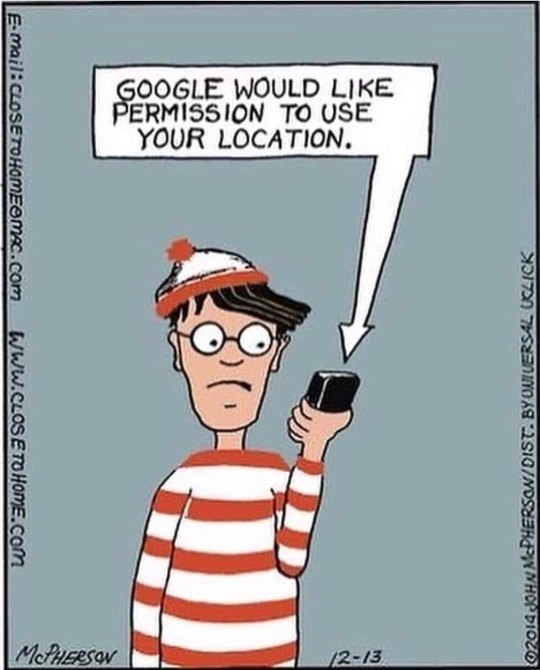
70 notes
·
View notes
Text
I SAW HAO TODAYYYYYY!!!!!!!!!!!!!!!!!!! TWICE!!!!!!
#didnt wanna share his location earlier to respect his privacy#but i literally ran into him TWICE#at the jewish museum in the morning nd at an art gallery in the afternoon#my artsy bf frrrr 🥺
10 notes
·
View notes
Text

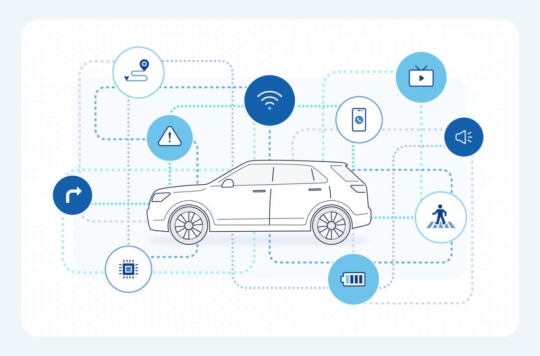
How automakers make use of data collected by connected cars is coming under scrutiny in California. On Monday, the California Privacy Protection Agency announced that it will review the data privacy practices of connected vehicle manufacturers. The agency is empowered to do so thanks to a 2018 state law, the California Consumer Privacy Act.
"Modern vehicles are effectively connected computers on wheels. They're able to collect a wealth of information via built-in apps, sensors, and cameras, which can monitor people both inside and near the vehicle," said Ashkan Soltani, CPPA's executive director.
"Our Enforcement Division is making inquiries into the connected vehicle space to understand how these companies are complying with California law when they collect and use consumers' data," he said in a statement.
Connected cars are fast becoming ubiquitous—it may well be impossible to buy a new car, truck, or SUV in 2023 that doesn't have at least one embedded modem in it. In the mid-2010s, many OEMs saw dollar signs at the prospect of monetizing data collected by their deployed vehicle fleets, and unlike with cellphones, it can be hard or impossible to disable location tracking in one's car.
"Under the California Consumer Privacy Act, geolocation is considered personal information. People have the right to say no to being tracked in their cars, but it is unclear if car companies are providing this right," said Justin Kloczko, a privacy advocate at Consumer Watchdog. "These companies know more about us than we know about ourselves, and they’re the ones in control of our personal information, not us," Kloczko said.
(continue reading)
#politics#location tracking#smart cars#privacy rights#data mining#spyware#geolocation data#connected cars#data protection#data privacy#consumer protection#geolocation tracking
45 notes
·
View notes
Text
there’s running into a famous person while you’re out and about and there’s hunting him down like he’s a wanted man
#y’all need to stop that with daniel im sorry#sharing his location on twt like hello???? thats invasion of privacy????
29 notes
·
View notes